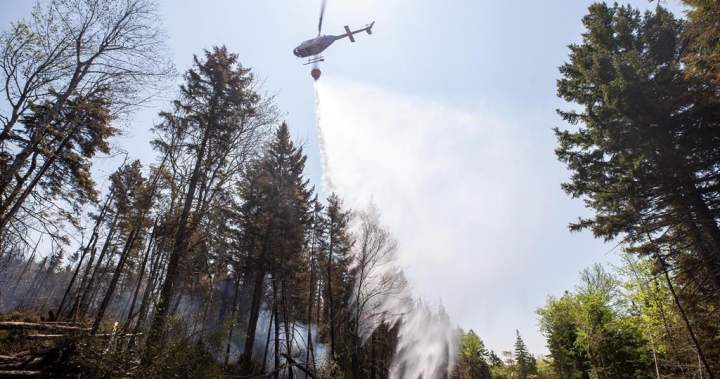Provincial parks will shut down across Nova Scotia starting later Tuesday, the government says, as the province faces a dry summer and heightened wildfire risk.
With a burn-ban already in place, officials said Tuesday they’re shuttering parks as of 4 p.m. to protect the public.
“We are telling Nova Scotians to stay out of the woods,” said Premier Tim Houston during a press conference.
The provincial parks ban restricts the public from unnecessary travel into the forests and partake in activities including hiking, camping, fishing and the use of wood.
The public will also not be allowed to use vehicles in the woods or access trail systems.
While camping is allowed, it is only permitted in official campgrounds.
Private landowners are free to use their own properties but cannot host other guests to use the wooded areas of their properties, the government said.
The restrictions will remain in place till Oct. 15 or until conditions allow them to be lifted.
The fine for breaking the rules will result in a $25,000 fine – the same amount as the burn ban penalty, which was put in place last Wednesday.

Get breaking National news
For news impacting Canada and around the world, sign up for breaking news alerts delivered directly to you when they happen.
The burn ban applies to open fires such as campfires, bonfires, brush fires and fires in chimeneas, as well as any other fire that is not enclosed and uses wood as a fuel.
Non-wood burning devices, such as charcoal, gas barbeques and gas stoves are allowed to be used. The ban also overrides any permits that have been issued for industrial burning.
To date, seven fines have already been issued to individuals for breaking the burn ban.
“I’m losing sleep about what’s happening … as a society we must do everything possible to protect each other,” Houston said.
“The risk is very high right now.”
Tory Rushton, minister of natural resources, said these steps are necessary to protect the firefighters as well.
Rural fire departments have raised concerns over the recent dry spell, as their worries grow about low water levels and their ability to respond to emergencies, Rushton explained.
“We’ve had a lot of hot, dry weather, very little rain and there’s no significant rain in the forecast in the near future,” he said.
For those conducting silviculture or forestry activities on their land, Rushton is urging a transition to nighttime operations to reduce the risk of wildfires.
“We are encouraging contractors and homeowners to shift their operations to nighttime hours, we have already seen some contractors make the change,” Rushton added.
While the restriction is in place, people can still access beaches and parks.
— with files from Rebecca Lau
Read the full article here
